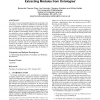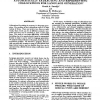253 search results - page 25 / 51 » Using Syntactic Knowledge for QA |
128
Voted
WWW
2007
ACM
16 years 2 months ago
2007
ACM
The ability to extract meaningful fragments from an ontology is key for ontology re-use. We propose a definition of a module that guarantees to completely capture the meaning of a...
COLING
1996
15 years 3 months ago
1996
This work attempts to provide a robust Thai morphological analyzer which can automatically assign the correct part-of-speech tag to the correct word with time and space efficiency...
120
click to vote
FQAS
2004
Springer
15 years 7 months ago
2004
Springer
Abstract. There is currently great interest in integrating knowledge discovery research into mainstream database systems. Such an enterprise is nontrivial because knowledge discove...
102
click to vote
COLING
2000
15 years 3 months ago
2000
This paper proposes a new unsupervised learning method for obtaining English part-ofspecch(POS) disambiguation rules which would improve thc accuracy of a POS tagger. This method ...
144
Voted
ACL
1990
15 years 3 months ago
1990
Collocational knowledge is necessary for language generation. The problem is that collocations come in a large variety of forms. They can involve two, three or more words, these w...


